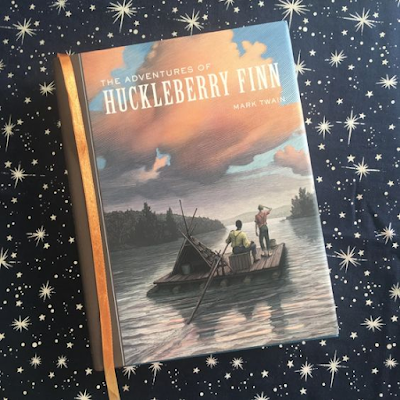Mark Twain's "The Adventures of Huckleberry Finn" plunges us into the murky waters of pre-Civil War Mississippi, guided by the mischievous and endearing voice of Huck Finn. Huckleberry, or Huck, a poor, uneducated boy, finds himself trapped between the suffocating expectations of "sivilization" and the raw freedom of the river, personified by his runaway slave friend, Jim.
Their river odyssey becomes a canvas for Huck's moral awakening. He grapples with societal indoctrination that brands Jim as property, yet feels an undeniable human connection with him. His conscience wrestles with conflicting narratives, torn between loyalty to authority and the growing realization of Jim's essential humanity.
The river, a swirling symbol of both escape and danger, throws obstacles at them. From con artists and grifters to feuds and shootouts, each encounter exposes the hypocrisy and barbarity of the antebellum South. Huck witnesses the cruelty of slavery firsthand, forcing him to confront his own internalized prejudices.
Yet, amidst the darkness, moments of humor and genuine human connection shine through. Huck's naivety often lands him in comical situations, while his interactions with Jim reveal a deep bond of friendship and mutual respect. Jim's wisdom and quiet resilience serve as a constant counterpoint to Huck's impulsiveness and confusion.
The journey isn't just downstream. Huck and Jim navigate moral rapids, questioning societal norms and wrestling with their individual place in a deeply flawed world. Huck's internal struggle over Jim's freedom reaches a peak when he decides to warn Miss Watson about Jim's whereabouts, only to ultimately realize the gravity of his potential betrayal.
The climax arrives with a series of twists and turns, revealing the complexity of slavery's web. While the ending may seem inconclusive, it leaves a lasting impression on the reader. Huck, forever changed by his experiences, chooses his own path, rejecting "sivilization" and its false morality. He embarks on a new journey, leaving readers to ponder the meaning of freedom and the ongoing fight for racial equality.
"The Adventures of Huckleberry Finn" is more than just a coming-of-age story. It's a scathing satire of social injustice, a poignant exploration of friendship and morality, and a timeless tribute to the enduring human spirit. Through Huck's adventures, Twain invites us to question our own biases, challenge societal norms, and embrace the liberating power of choosing one's own path.

Няма коментари:
Публикуване на коментар